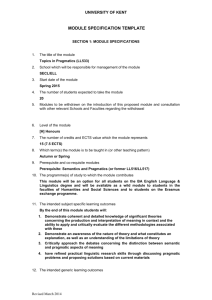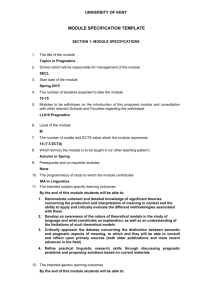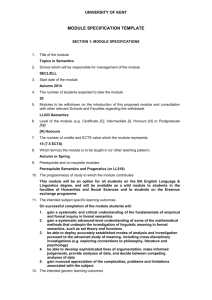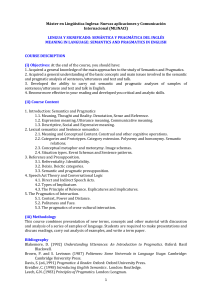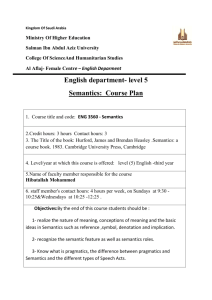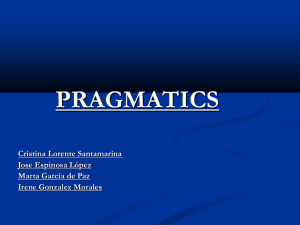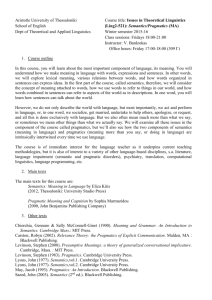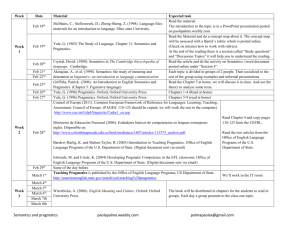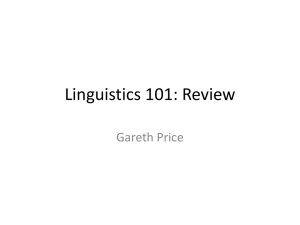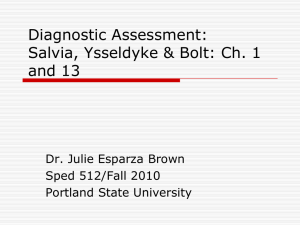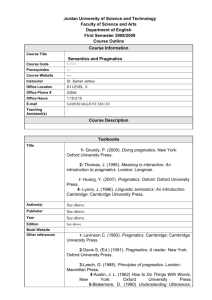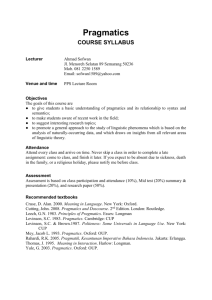University of Kent at Canterbury
advertisement
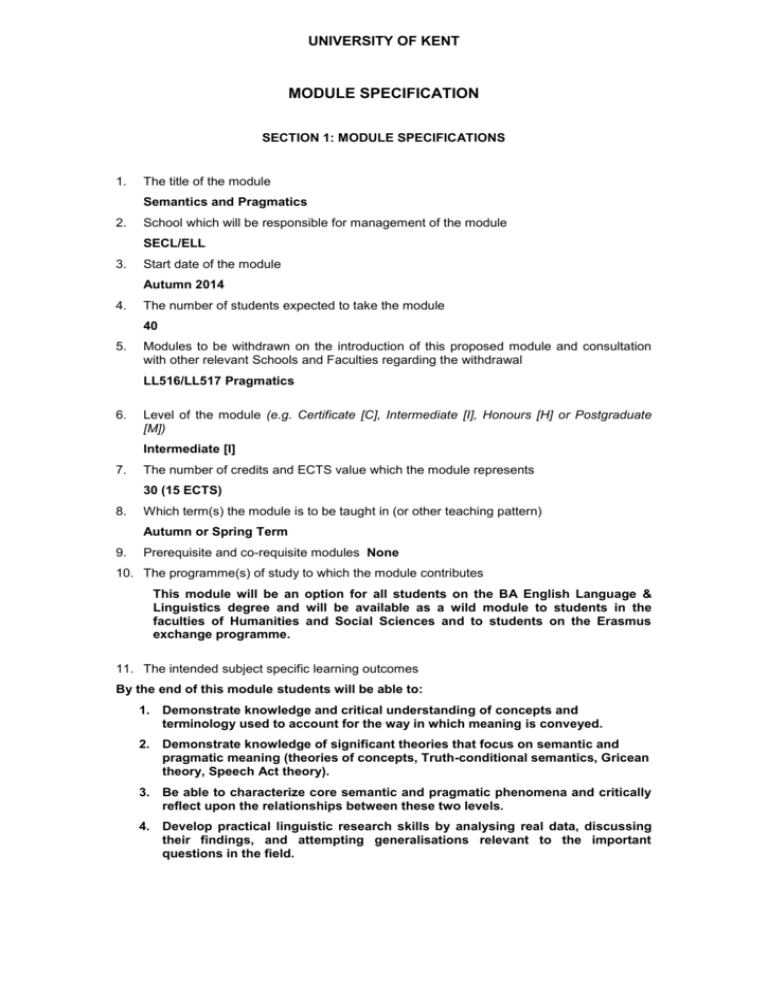
UNIVERSITY OF KENT MODULE SPECIFICATION SECTION 1: MODULE SPECIFICATIONS 1. The title of the module Semantics and Pragmatics 2. School which will be responsible for management of the module SECL/ELL 3. Start date of the module Autumn 2014 4. The number of students expected to take the module 40 5. Modules to be withdrawn on the introduction of this proposed module and consultation with other relevant Schools and Faculties regarding the withdrawal LL516/LL517 Pragmatics 6. Level of the module (e.g. Certificate [C], Intermediate [I], Honours [H] or Postgraduate [M]) Intermediate [I] 7. The number of credits and ECTS value which the module represents 30 (15 ECTS) 8. Which term(s) the module is to be taught in (or other teaching pattern) Autumn or Spring Term 9. Prerequisite and co-requisite modules None 10. The programme(s) of study to which the module contributes This module will be an option for all students on the BA English Language & Linguistics degree and will be available as a wild module to students in the faculties of Humanities and Social Sciences and to students on the Erasmus exchange programme. 11. The intended subject specific learning outcomes By the end of this module students will be able to: 1. Demonstrate knowledge and critical understanding of concepts and terminology used to account for the way in which meaning is conveyed. 2. Demonstrate knowledge of significant theories that focus on semantic and pragmatic meaning (theories of concepts, Truth-conditional semantics, Gricean theory, Speech Act theory). 3. Be able to characterize core semantic and pragmatic phenomena and critically reflect upon the relationships between these two levels. 4. Develop practical linguistic research skills by analysing real data, discussing their findings, and attempting generalisations relevant to the important questions in the field. UNIVERSITY OF KENT 12. The intended generic learning outcomes include being able to: 1. Communicate the results of study and work accurately, with well-structured and coherent arguments in an effective and fluent manner both in speech and in writing 2. Develop their skills in critical reflection and analytical discussion of their own writing and the writing of others 3. Develop their ability to work cooperatively with others, exercising personal responsibility and sensitivity 4. Exchange relevant information through the use of shared access to documents and web-based learning 13. A synopsis of the curriculum This module will introduce the students to the study of meaning at the levels of semantics and pragmatics. The discussed topics will range from the study of word meaning to the study of sentence meaning and utterance (contextualised) meaning. The module will introduce significant notions and theories for the field of semantics and pragmatics, such as theories of concepts, Truth Conditions, the Gricean theory of conversational implicatures, Speech Act theory, and Politeness theory. The students will have the opportunity to reflect upon real data and analyse the processes of conveying and understanding meaning at the semantics/pragmatics interface. 14. Indicative Reading List Grundy, P. (2000) (2nd ed.). Doing Pragmatics. London: Arnold Publishing Horn, L. & Ward, G. (2005). The Handbook of Pragmatics. Oxford: Blackwell Saeed, J. (2003). Semantics. Oxford: Blackwell Riemer, N. (2010). Introducing Semantics. Cambridge: CUP. Yule, G. (1996). Pragmatics. Oxford: Oxford University Press 15. Learning and Teaching Methods, including the nature and number of contact hours and the total study hours which will be expected of students, and how these relate to achievement of the intended learning outcomes This module will be taught in two weekly sessions: a one-hour lecture and a twohour seminar, for ten weeks, 30 contact hours in total. The lectures will address key aspects of meaning with examples as well as key pragmatic theories (subject specific learning outcomes 11.1-3), and the seminars will provide for in-depth practice and discussion of the topics covered in the lectures (subject specific learning outcome 11.4; generic learning outcomes 1-4). Total number of study hours for the module (including all contact time, private study and work on assignments): 300 16. Assessment methods and how these relate to testing achievement of the intended learning outcomes 100% coursework, consisting of seminar participation, one take-home Problem Set and an essay. Seminar Participation: 15% Take-home Problem Set, 2000 words: 40% UNIVERSITY OF KENT Essay, 2500 words: 45% The Problem Set will assess students’ understanding of the material and ability to analyze data and to apply their knowledge of semantic/pragmatic theories and phenomena and will test learning outcomes 11.3-4 and 12.2, 12.4. The essay will additionally assess their ability to critically approach these theories, while also taking their knowledge further, with the use of some primary sources and will test learning outcomes 11.1-3 and 12.1-2. The mark for seminar participation will reflect students’ ability to engage clearly and effectively in oral discussion and argument and will test learning outcomes 11.1-2, 11.4, and 12.3. 17. Implications for learning resources, including staff, library, IT and space No major implications; computer facilities and large whiteboards are essential. 18. The School recognises and has embedded the expectations of current disability equality legislation, and supports students with a declared disability or special educational need in its teaching. Within this module we will make reasonable adjustments wherever necessary, including additional or substitute materials, teaching modes or assessment methods for students who have declared and discussed their learning support needs. Arrangements for students with declared disabilities will be made on an individual basis, in consultation with the University’s disability/dyslexia support service, and specialist support will be provided where needed. 19. Campus(es) where module will be delivered: Canterbury SECTION 2: MODULE IS PART OF A PROGRAMME OF STUDY IN A UNIVERSITY SCHOOL Statement by the School Director of Learning and Teaching/School Director of Graduate Studies (as appropriate): "I confirm I have been consulted on the above module proposal and have given advice on the correct procedures and required content of module proposals" ................................................................ .............................................. Director of Learning and Teaching/Director of Graduate Studies (delete as applicable) Date ………………………………………………… Print Name Statement by the Head of School: "I confirm that the School has approved the introduction of the module and, where the module is proposed by School staff, will be responsible for its resourcing" ................................................................. .............................................. Head of School Date UNIVERSITY OF KENT ……………………………………………………. Print Name SECTION 3: MODULE IS PART OF A PROGRAMME IN A PARTNER COLLEGE OR VALIDATED INSTITUTION (Where the module is proposed by a Partner College/Validated Institution) Statement by the Nominated Officer of the College/Validated Institution (delete as applicable): "I confirm that the College/Validated Institution (delete as applicable) has approved the introduction of the module and will be responsible for its resourcing" ................................................................. Nominated Responsible Officer College/Validated Institution of .............................................. Partner …………………………………………………. Print Name ………………………………………………….. Post …………………………………………. Partner College/Validated Institution Module Specification Template Last updated July 2010 Date
